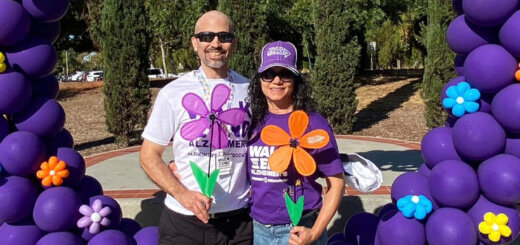Caring for mom as a family
Florence Marquez dedicated her life to helping others. When she was diagnosed with Alzheimer’s disease her family stepped up to help. Her daughters, Barbara and Becky Marquez share their story about caring for their mother.
Nourishing your soul
If you were to walk into Florence Marquez’s home, you would have been greeted with a fresh cup of coffee, warm food and an open heart to welcome you.
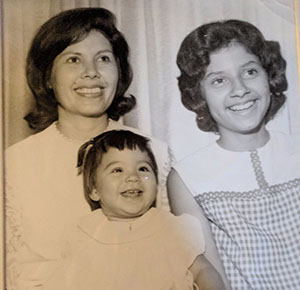
This mother of five was the type of person who knew how to feed your body and nourish your soul. It was common knowledge that once you met Florence Marquez you were never the same.
“Mom just meant home, security and unconditional love. She was your biggest cheerleader,” shared Becky Marquez, Florence’s youngest daughter. “Everything you would think of for your ideal parent, it was her.”
A community leader
Barbara Marquez, Florence’s oldest daughter, was inspired by her mother’s service to her community.
“My mother and father, Deacon Phillip Marquez, marched alongside Cesar Chavez and were strong supporters of the United Farmworker Union Movement. She served as an elected school board trustee in an ethnically diverse school district to ensure that all children received a good education in a language that they understood.
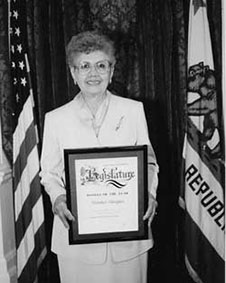
“She was president of a development corporation that developed an affordable housing complex complete with a women’s center and a child development center in East San Jose. It was such a fabulous development that it received an award from the US Department of Housing and Urban Development.
“For all these efforts and her many years of volunteer service, in 2000, Florence Marquez received the Legislative Woman of the Year Award by the California State Senate.”
Lost in a city of more than a million people
Florence was a smart woman who was able, for a time, to cover up her memory loss. “My mother was sharp enough to rationalize the things she forgot,” said Becky.
However, one scary day, Florence went to visit a friend and didn’t come home. Hours passed by and no one had seen her. She hadn’t made it to her friend’s house and she hadn’t come home.
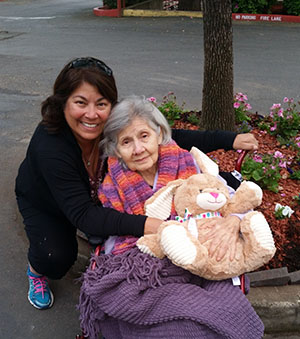
At the time Becky worked for the San Jose Police Department. “I got the phone call that mom was missing, but in a city of over a million people, where do you start?”
Four and half hours later, Florence walked into a mini mart and asked for help. The kind man that worked there borrowed her cell phone and called her family. Becky raced over to get her mom.
“I walked into the market in my uniform and my mom smiled at me,” said Becky. “She put her hand on my arm, and she asked, “˜my daughter works for the San Jose Police Department, do you know her?’ There’s nothing harder than when your mom doesn’t recognize you.”
It was after this incident that they decided it was time for mom to see a doctor. Florence was diagnosed with Alzheimer’s in 2007.
Siblings supporting each other
After the diagnosis, Florence moved in with Barbara. Becky said, “Barbara was the natural choice. She took on 95% of everything.”
However, the Marquez family was not one to let Barbara stand alone. Becky and her brothers all stepped up to do their part and provide what help they could. For the most part, that was giving Barbara a break from caring for her mother, commonly referred to as respite, in order to care for herself.
“Sometimes we’d take mom for a week,” said Becky. “Other times we’d go and visit mom at Barbara’s to give Barbara the break she needed.”
In Barbara’s opinion it was a family effort. “We wanted to keep mom at home, but it can’t be on the shoulders of just one person or one household,” said Barbara. “That person needs a break.”
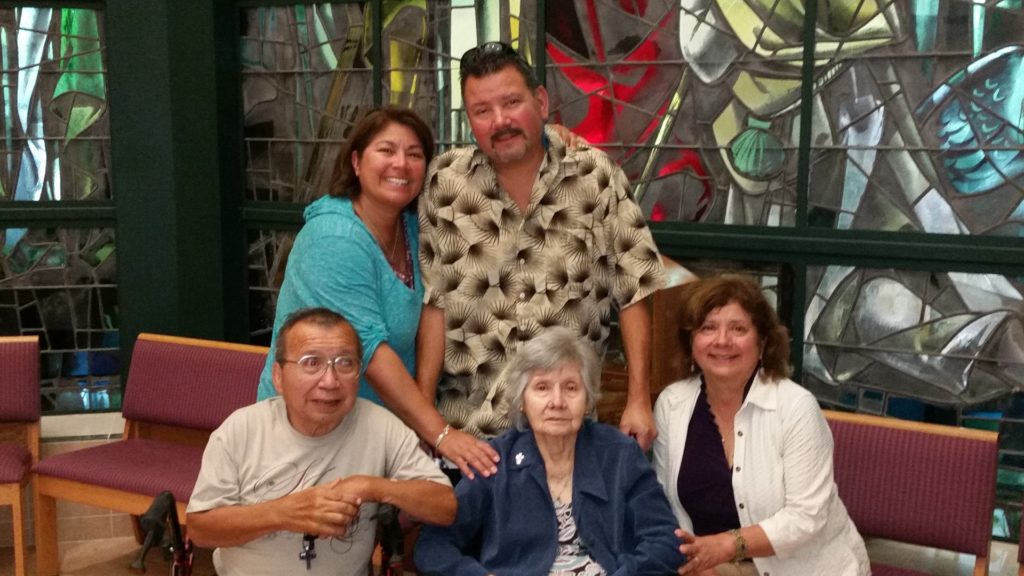
Welcomed advice from mom
There came a time when Florence needed to move into a facility. “I couldn’t lift her anymore,” said Barbara. “She was already going to an adult daycare that had a memory care facility attached to it, so it was an easy place to transition her to.”
Becky recalled a pivotal conversation with her mom before the disease had progressed. “She said to me, “˜If I’m ever ill and can’t take care of myself, I want you to know that it’s okay to move me into a facility.'”
At the time Becky was resistant. She told her mom that she would never do that to her. “When the decision did arise, I was able to recall that moment,” said Becky. “Looking back, I’m grateful that she had this conversation with me.”
Florence made sure to have this conversation with Barbara as well. “Conversations like this may be hard but are necessary to have before the disease progresses,” said Barbara. “We were lucky our mother could share her wishes with us ahead of time.”
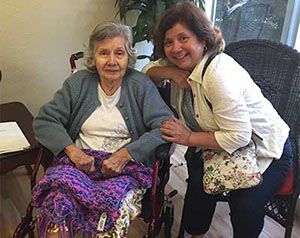
The last days at “˜Camp Flo’
In the last days of Florence’s life, her family rallied around her at the facility, which they lovingly referred to as Camp Flo. “People were sleeping in the hallway,” recalled Becky. “They finally gave us a room to sleep in because we never left her side.”
Florence Marquez died in January 2018, surrounded with love by her family.
It’s okay to ask for help
Alzheimer’s is not a normal part of aging, but many Hispanic families have a different perception. Some families feel embarrassed and keep the diagnosis a secret. “We need to start talking about it in our community,” said Barbara. “So many people say, “˜I know someone who has it,’ but If we don’t talk about it, then you lose precious time to do the necessary medical, financial and legal panning before the disease is too far along.”
“It’s better to make a plan beforehand then to wait until you’re in a crisis. This way you can involve your loved one in the decision making process.”
“Asking for help is not a sign of weakness, it’s a sign of strength. It isn’t easy, but it takes courage to ask for help.”
“The Latino family has resilience. They may struggle, but they will figure it out,” said Barbara. “As a community we need to make sure there are culturally appropriate resources available. It’s more than knowing just the facts. It’s knowing how to share this kind of information with their families.”
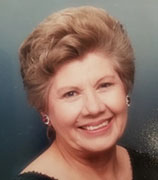
Continuing her mother’s legacy
After her mom’s death, Barbara was inspired by her mother’s life of service. She couldn’t sit idly by while others went through the same things she did with her family. Barbara decided the best course of action was to volunteer her time with the Alzheimer’s Association.
In the past 20 months Barbara has joined the board of the Northern California and Northern Nevada Chapter of the Alzheimer’s Association, serves on two committees, is the ambassador for Congressman Ami Bera, presented at the Latino Conference in San Jose and volunteers for Walk to End Alzheimer’s.
24/7 support for all stages
If you’re worried your loved one may have Alzheimer’s or dementia, Barbara recommends familiarizing yourself with the 10 Warning signs. “You don’t need a diagnosis to call the Alzheimer’s Association’s 24/7 Helpline,” notes Barbara. “You can call them even if you’re just concerned.”
If you’re currently a caregiver, Becky recommends talking with your loved one about their wishes and having a plan in place. “Having regrets is the worst thing you want once your loved one is gone.”
If you’re a family member or friend of a caregiver, Becky recommends that you reach out and offer support. “This isn’t just one person’s problem because everyone can help in their own way. Caregivers need someone to help them physically, not just by sending them money. They need you to be there and allow them to take a break.”
Learn about free care and support resources available to all families impacted by Alzheimer’s and other dementias at alz.org/care.
For information in Spanish visit alz.org/espanol.
The Alzheimer”˜s Association is here all day, every day for people facing Alzheimer”˜s disease through our free 24/7 Helpline (800.272.3900).
A portion of Barbara’s story was originally published in the Alzheimer’s Association blog.
Learn More





